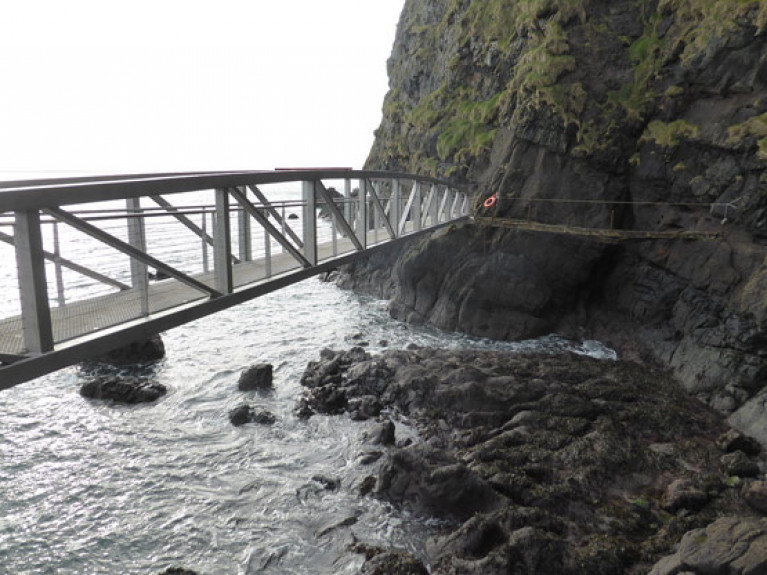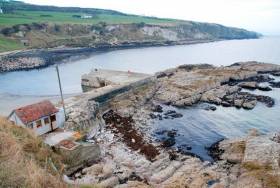Displaying items by tag: Islandmagee
Northern Ireland campaigners are mounting a legal challenge over a Stormont minister’s approval for a gas storage project in Islandmagee near a key Game of Thrones filming location, according to BelfastLive.
InfraStrata’s long-gestating plans to carve salt caves for gas storage under Larne Lough — where scenes featuring ‘The Wall’ from the popular fantasy TV series were filmed — were recently given the green light, as previously reported on Afloat.ie.
But the move to grant a Marine Licence for piping sludge over land from the lough into the sea off Isle of Muck was criticised by a coalition of conservation groups who fear the impact on many species “under considerable threat” at its nature reserve.
It later emerged that NI Environment Minister Edwin Poots went against the advice of his own civil servants when he granted the licence in October.
Now the campaigners of No Gas Caverns Islandmagee have confirmed that legal proceedings against the decision have begun, citing concerns with how the salt caverns will be decommissioned after use.
BelfastLive has much more on the story HERE.
Islandmagee Gas Storage Project Gets Green Light off Antrim Coast
A gas storage project, located off the coast of Northern Ireland, has been awarded a Marine Construction Licence, giving it the green light to proceed towards construction.
Islandmagee Energy’s gas storage project will initially unlock seven much-needed gas storage caverns. Once constructed and fully operational, these gas caverns will hold around 500 million cubic metres of natural gas and provide security of supply during peak demand for up to 14 days for Northern Ireland.
As Afloat previously reported, conservation groups opposed the plan.
The UK has one of Europe’s lowest gas storage capacities at just 1% of its annual demand in storage, leaving the UK much less resilient to supply issues than other European countries which hold as much as 20-30% of annual demand in storage. Once fully developed, the Islandmagee gas storage project will hold over 25% of the UK’s storage capacity.
John Wood, Group CEO of Islandmagee Energy’s parent company, Harland & Wolff, comments:
“This is good news for consumers and businesses in the UK who are currently experiencing distressing hikes in energy prices and fears of potential blackouts as gas and power grids face peak demand stresses during the winter months.
“With the current energy supply crisis, everyone now understands just how important gas storage is to secure supply and protect against extreme volatility in gas and power prices in the UK.
“We are delighted with this major step forward in the project’s journey, paving the way for the construction of our facilities. We look forward to playing a greater role within the energy sector and in securing a safer future for all.”
Islandmagee Energy also has longer term ambitions to store hydrogen.
John Wood further explains: “Large-scale hydrogen storage will enable the UK to make the most of excess renewable energy as it transitions to net zero.
“The existing power grid cannot always accept all of the electricity generated from wind farms during periods of surplus wind power generation. It is during these frequently occurring periods that wind farms are temporarily scaled back as there is no way to store the excess electricity produced. Production of large-scale hydrogen and its storage is the long-term solution to this.
“Excess wind generated power can be used to produce green hydrogen which can then be stored in salt caverns for future use during peak demand periods.”
In addition to enhancing the security and flexibility of the UK’s energy supplies and supporting the transition to a net zero, the Islandmagee gas storage project will create long-term and high value employment and support investment into Northern Ireland.
During construction, 400 direct jobs will be created, as well as between 800 and 1,200 indirect jobs, expected to bring around £7 million into the local economy annually. It has also been estimated that during this stage that for every £1 million of capital expenditure, a further £2 million will be created in the economy per year; this means with 75% local content, the wider economy could benefit by around £400 million.
During operations, a further 60 direct jobs may be created, expected to bring in around £1 million into the local economy per year and between 120 and 180 indirect which would bring in a further £2-3 million every year.
Gobbins Cliff Path Reopening With Covid-19 Safety Upgrades
Co Antrim’s famous coastal path at The Gobbins is set to reopen next week on Tuesday 1 September. months after it was closed in the initial wave of coronavirus restrictions in Northern Ireland.
As RTÉ News reports, the cliff path — which was restored in 2015 after being closed for decades — has had a number of safety upgrades to allow for social distancing and hygiene standards to fight the spread of coronavirus.
Prebooking is also essential to allow for proper management of the popular Islandmagee attraction, renowned for its white-knuckle series of rugged steps, tunnels, caves and bridges.
#MarineWildlife - Islandmagee locals are appealing to Northern Ireland's Environment Minister to add their waters to the list of recently proposed Marine Conservation Zones.
As the Belfast Telegraph reports, the call comes over fears that a planned Gaelectric gas power station could create a 'dead zone' in the North Channel caused by brine runoff from the plant.
Gaeletric maintains that even under a worst-case scenario, any impact of brine pumped into the sea on marine wildlife and plantlife would be low.
But the Islandmagee Community Residents Association argues that the development poses a threat to a "delicate and biodiverse" ecosystem in the area, which is home to vulnerable colonies of puffins as well as black guillemots and razorbills, among others.
As reported in December on Afloat.ie, Rathlin, Waterfoot, Outer Belfast Lough and Carlingford Lough were put forward for consideration as Marine Conservation Zones, the public consultation for which closed last Friday 11 March.
The Belfast Telegraph has more on the story HERE.
Woman Rescued From Islandmagee Cliff
#Rescue - A woman is in stable condition in hospital after she was rescued from a sea cliff in Islandmagee on Tuesday (27 October) an operation that "wasn’t straightforward", as the News Letter reports.
It's believed the woman had been walking along the top coastal path when she got into difficulty late on Tuesday evening.
She was airlifted from the site by helicopter tasked from Scotland after being stabilised by paramedics.
The incident comes just weeks after emergency services rushed to the aid of an elderly man who fainted on the newly reopened Gobbins cliff walk in the same area.
The new cliff path has been hailed by the Guardian as "a reboot of a magnificent feat of engineering that originally opened in 1902", with local musical hero Michael Bradley of the Undertones writing about its heart-stopping mix of beauty and danger.































































